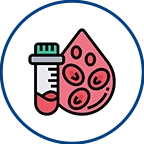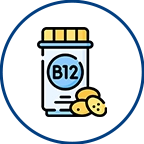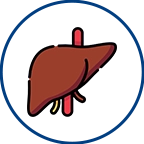Home Remedies for Fungal Infection

Fungal infections are common and can afflict various parts of the body, causing discomfort and inconvenience. While medical treatments are readily available, many individuals prefer exploring natural alternatives to address these issues effectively. From household ingredients to herbal solutions, we've curated an extensive list of remedies to guide you in finding relief from fungal infections without resorting to harsh chemicals. Let's embark on a journey into the realm of natural healing, taking a step toward healthier, happier skin and nails.
Home Sample Collection
Symptoms of Fungal Infections
Fungal infections can manifest in various ways, depending on the type of infection and the affected body area. However, they often exhibit common symptoms, including:
-
Itching: Itchy skin is a prevalent symptom, particularly in skin and mucous membrane fungal infections.
-
Redness and Inflammation: Fungal infections can cause redness and inflammation, leading to discomfort and sensitivity.
-
Rash: The development of red or scaly patches on the skin is a typical sign of fungal infections.
-
Blisters: Some fungal infections result in fluid-filled blisters, such as athlete's foot or herpes.
-
Peeling or Cracking Skin: Skin may peel or crack in certain fungal infections, causing pain and vulnerability to further infections.
-
Pain or Discomfort: Fungal infections can be painful, especially in sensitive areas or deeper skin layers.
-
Unpleasant Odor: Infections like athlete's foot or fungal nail infections can produce a foul odor.
-
Discolored Nails: Nail fungal infections can cause nails to become discolored, thickened, and brittle.
-
Vaginal Discharge: Women with vaginal yeast infections may experience abnormal discharge, itching, and irritation.
It's essential to remember that these symptoms can overlap with other conditions, underscoring the importance of consulting a healthcare professional for a proper diagnosis and suitable treatment when suspecting a fungal infection.
Causes of Fungal Infections
Fungal infections stem from various fungi, microorganisms commonly found in our environment. These fungi thrive in moist, warm, and dark conditions, making specific body areas more susceptible to infection. Common causes and risk factors for fungal infections encompass:
-
Weakened Immune System: Conditions such as illnesses, certain medications (e.g., steroids), or medical conditions (e.g., HIV/AIDS) can elevate the risk of fungal infections.
-
Warm and Humid Environments: Fungi thrive in warm, moist environments like public showers, swimming pools, and sweaty footwear.
-
Poor Hygiene: Inadequate personal hygiene can create an environment conducive to fungal growth, increasing the infection risk.
-
Skin-to-Skin Contact: Direct touch with an affected individual or contaminated surfaces such as towels, clothing, or sports equipment can spread fungal infections.
-
Tight Clothing: Wearing tight-fitting attire that traps moisture can facilitate fungal growth, especially in friction-prone, sweat-prone areas.
-
Damp Footwear: Extended periods with damp or sweaty shoes and socks can lead to conditions like athlete's foot.
-
Underlying Health Conditions: Some health conditions, like diabetes, can heighten the risk of specific fungal infections like candidiasis.
-
Antibiotics and Steroids: Prolonged use of antibiotics or steroids can disrupt the skin or mucous membrane microorganism balance, increasing the fungal infection risk.
-
Age: While fungal infections can affect individuals of all ages, certain types may be more common in specific age groups.
-
Excessive Moisture in Skin Folds: Infections like jock itch or intertrigo can occur in skin folds where moisture accumulates.
-
Weakened Nails: Fungal nail infections (onychomycosis) may develop in damaged or weakened nails.
Practicing good hygiene, maintaining skin dryness, and refraining from sharing personal items can mitigate the risk of fungal infections. If a fungal infection is suspected, seeking prompt medical attention ensures accurate diagnosis and appropriate treatment.
Home Remedies for Fungal Infections
-
Tea Tree Oil: Tea tree oil, celebrated for its potent antifungal properties, can be diluted with a carrier oil and applied topically to the affected area. It acts effectively against various fungal infections, providing relief from itching and inflammation.
-
Apple Cider Vinegar: Diluted apple cider vinegar serves as an excellent foot soak for conditions like athlete's foot or a topical solution for fungal skin infections. Its acidic nature helps create an unfavorable environment for fungi.
-
Garlic: Garlic contains natural antifungal compounds. Crush a few garlic cloves and apply the paste to the affected area. Its properties aid in combating fungal infections and promoting healing.
-
Yogurt: Probiotic-rich yogurt can be consumed to encourage beneficial bacteria growth, helping combat fungal infections from within. It contributes to restoring microbial balance in the body.
-
Coconut Oil: Coconut oil, when applied to the affected area, can alleviate itching and irritation linked to fungal infections. Its soothing properties support the healing process.
-
Aloe Vera: Aloe vera gel's soothing and hydrating attributes make it beneficial for aiding the healing process of fungal infections when applied topically.
-
Oregano Oil: Oregano oil contains potent antifungal compounds. When diluted with a carrier oil, it can be applied topically to the affected area, providing relief from fungal infections.
-
Saltwater Soak: A saltwater soak can prove helpful for fungal nail infections. Dissolve salt in warm water and soak your feet or hands for approximately 15 minutes to combat the infection.
-
Baking Soda: Sprinkling baking soda in shoes or socks can help maintain dry feet, reducing moisture that fosters fungal growth and aiding in preventing fungal infections.
-
Turmeric: Turmeric possesses antifungal properties. Create a paste by mixing turmeric with water and apply it to the affected area to combat fungal infections.
-
Lemon Juice: Lemon juice's acidity can inhibit fungal growth. Applying fresh lemon juice to the affected skin may help in managing fungal infections.
Conclusion
In conclusion, home remedies offer valuable support in managing mild fungal infections, delivconclusionering natural and accessible solutions for relief. From tea tree oil and apple cider vinegar's antifungal prowess to the soothing benefits of aloe vera and coconut oil, these remedies contribute to comfort and the healing process.
However, it's crucial to acknowledge the boundaries of home remedies and understand when professional medical attention is essential. Severe or persistent infections, spreading or recurrent conditions, and cases involving vulnerable individuals warrant immediate evaluation by a healthcare professional.
By harnessing the power of home remedies alongside expert guidance, we can effectively combat fungal infections, fostering improved skin and nail health. Remember to prioritize excellent hygiene practices, evade triggers conducive to fungal growth, and seek medical guidance when necessary for a holistic and successful approach to managing fungal infections.
Frequently Asked Questions
Can fungal infections go away on their own without treatment?
Some mild fungal infections may resolve on their own, but it's advisable to seek treatment to prevent complications and expedite healing.
Can I combine multiple home remedies for better results?
Combining remedies may be effective, but it's essential to use them safely and not overdo it, as some ingredients may interact or cause skin irritation.
How long does it typically take for home remedies to show results in treating fungal infections?
The time it takes to see results can vary depending on the severity of the infection and the individual's response. Improvement may take a few days to a few weeks.
Are over-the-counter antifungal creams and home remedies equally effective?
Over-the-counter creams are often more potent and suitable for severe infections, while home remedies are generally used for milder cases or as preventive measures.
Are there any side effects associated with using home remedies for fungal infections?
Most home remedies are safe when used as directed, but some individuals may experience mild skin irritation or allergies. Always do a patch test first.
Can I prevent fungal infections by practicing good hygiene alone?
Good hygiene is crucial, but other factors like a healthy diet, proper footwear, and avoiding shared personal items also play a significant role in prevention.
Are these home remedies suitable for pregnant women?
While some home remedies are generally safe, it's advisable for pregnant women to consult their healthcare provider before using any remedy to ensure it's safe during pregnancy.
Are there any dietary changes I can make to prevent fungal infections?
A balanced diet, rich in probiotics and low in sugar or processed foods, can help support a healthy microbial balance in your body, reducing the risk of fungal infections.
Book Appointment
Our Locations Near You in Hyderabad
3KM from Banjara Hills
1.9KM from Yusufguda
3KM from Madhura Nagar
5KM from Shaikpet




